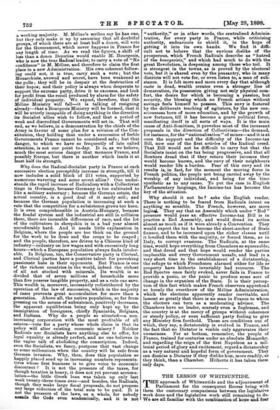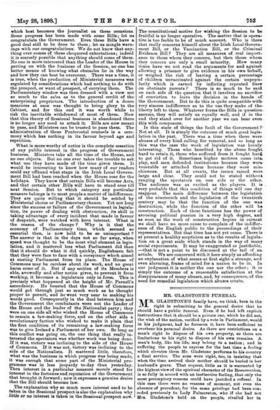THE LESSON OF WHITSUNTIDE.
THE approach of Whitsuntide and the adjournment of Parliament for the consequent Recess bring with them the customary comparisons between the legislative work done and the legislative work still remaining to do. We are all familiar with the combination of hope and fear which best becomes the journalist on these occasions. Some progress has been made with some Bills; let us congratulate the Government. Even these Bills have a good deal still to be done to them ; let us mingle warn- ings with our congratulations. We do not know that any- thing ever comes of these chequered exhortations; indeed it is scarcely possible that anything should come of them. No one is more interested than the Leader of the House in getting on with the business of the Session, no one has better means of knowing what obstacles lie in the way and how they can best be overcome. There was a time, it is true, when the production of Ministerial measures was regulated by considerations which bad nothing to do with the prospect, or want of prospect, of carrying them. The Parliamentary window was then dressed with a view not so much to the sales as to the general credit of the enterprising proprietors. The introduction of a dozen measures at once was thought to bring glory to the Cabinet, and for this end it was worth while to risk the inevitable withdrawal of most of them. Now that this theory of Sessional business is abandoned there is no longer any need to attack it. Bills are now meant to pass, and Ministers can be trusted to pass them. The administration of these Pentecostal counsels is a cere- mony which has nothing in its favour beyond age and repetition.
What is more worthy of notice is the complete cessation of any public interest in the progress of Government business. Ministers take all the time of the House, and no one objects. But no one ever takes the trouble to ask what use they have made of the time given them. It would be interesting to know how many of our readers could say offhand what stage in the Irish Local Govern- ment Bill had been reached when the House rose for the holidays. They know that certain Bills will become Acts, and that certain other Bills will have to stand over till next Session. But to which category any particular measure belongs is to most people a matter of indifference. They are quite willing that it should be settled by Ministerial choice or Parliamentary chance. Yet not long since the success or failure of the Government in legisla- tion, its power of dealing with obstruction, its skill in taking advantage of every incident that made in favour of despatch, were watched with keen interest. What is the reason of the change ? Why is it that the economy of Parliamentary time, which seemed so essential then, is now held to be so unimportant ? The answer is that in the days not so far away, when speed was thought to be the most vital element in legis- lation, and it mattered less what Parliament did than that it should do what it did quickly, Englishmen felt that they were face to face with a conspiracy which aimed at ousting Parliament from its place. The House of Commons may be careless about its work, and no great harm come of it. But if any section of its Members is able, avowedly and after notice given, to prevent it from working, it becomes a legislature only in form. This is precisely what happened at the height of Mr. Parnell's ascendency. He boasted that the House of Commons would get through just so much work as he thought proper to permit, and he went very near to making his words good. Consequently in the duel between him and the Government the combatants were not the Leader of the House and the leader of the Nationalist party; they were on one side all who wished the House of Commons to remain a law-making force, and on the other side a, revolutionary faction who wished to make it plain that the first condition of its remaining a law-making force was to give Ireland a Parliament of her own. So long as this conflict was going on, the one thing that really in- terested the spectators was whether work was being done. If it was, victory was inclining to the side of the House of Commons. If it was not, victory was inclining to the side of the Nationalists. It mattered little, therefore, what was the business in which progress was being made, it was enough that some part of the Ministerial pro- gramme was in less jeopardy to-day than yesterday. Then interest in a particular measure merely stood for interest in the fortunes and reputation of the Government that brought it forward; now it expresses a genuine desire that the Bill should become law.
The explanation why so much more interest used to be taken in the Sessional prospect is also the explanation why little or no interest is taken in the Sessional prospect now. The constitutional motive for wishing the Session to be fruitful is no longer operative. The motive that is opera- tive is too feeble to be of much account. Who is there that really concerns himself about the Irish Local Govern- ment Bill, or the Vaccination Bill, or the Criminal Evidence Bill ? They are all measures of real import- ance to those whom they concern, but then those whom they concern are only a small minority. How many times have we not read the arguments for and against allowing a prisoner to give evidence in his own behalf, or weighed the risk of leaving a certain percentage of children unvaccinated against the certain unpopu- larity which is earned by inflicting repeated fines on obstinate parents ? There is so much to be said on each aide of the question that it involves no sacrifice of conviction to leave the decision in the hands of the Government. But to do this is quite compatible with, very sincere indifference as to the use they make of the - liberty left to them. Whatever forms the Bills in question assume, they will satisfy us equally well, and if in the end they stand over for another year we can bear even this with composure.
Is this state of things the fault of the Government ? Not at all. It is simply the outcome of much good legis- lation in the past. There was a time when there were abuses of every kind calling for removal, and so long as this was the case the work of legislation was keenly interesting. Those who benefited by the abuse fought hard to retain it, those who suffered from it fought hare to get rid of it. Sometimes higher motives came hitt play, and men defended institutions because they were, venerable or attacked them because they were miss chievous. But at all events, the issues raised were, large and clear. They could not be stated without ranging the spectators on one side or the other. The audience was as excited as the players. It is .
very probable that this condition of things will one day reappear. The main difference between the legislation of the nineteenth and the legislation of the twentieth century may be that the function of the one was destruction, while the function of the other will be construction. Each of these functions has the power of arousing political passion in a very high degree, and as soon as the work of construction begins in earnest we shall have no more cause to complain of the indiffer- ence of the English public to the proceedings of their representatives. But that time has not yet come. There is at present a healthy scepticism as to the results of legisla- tion on a great scale which stands in the way of many social experiments. It may be exaggerated or justifiable, —that is not a point to be discussed at the tail of an article. We are concerned with it here simply as affording an explanation of what seems at first sight a strange, and even alarming, frame of mind for a nation to be in. In our judgment it is neither the one nor the other; it is simply the outcome of a reasonable satisfaction at the disappearance of many abuses, and, by consequence, of this/ need for remedial legislation which abuses create.



































 Previous page
Previous page